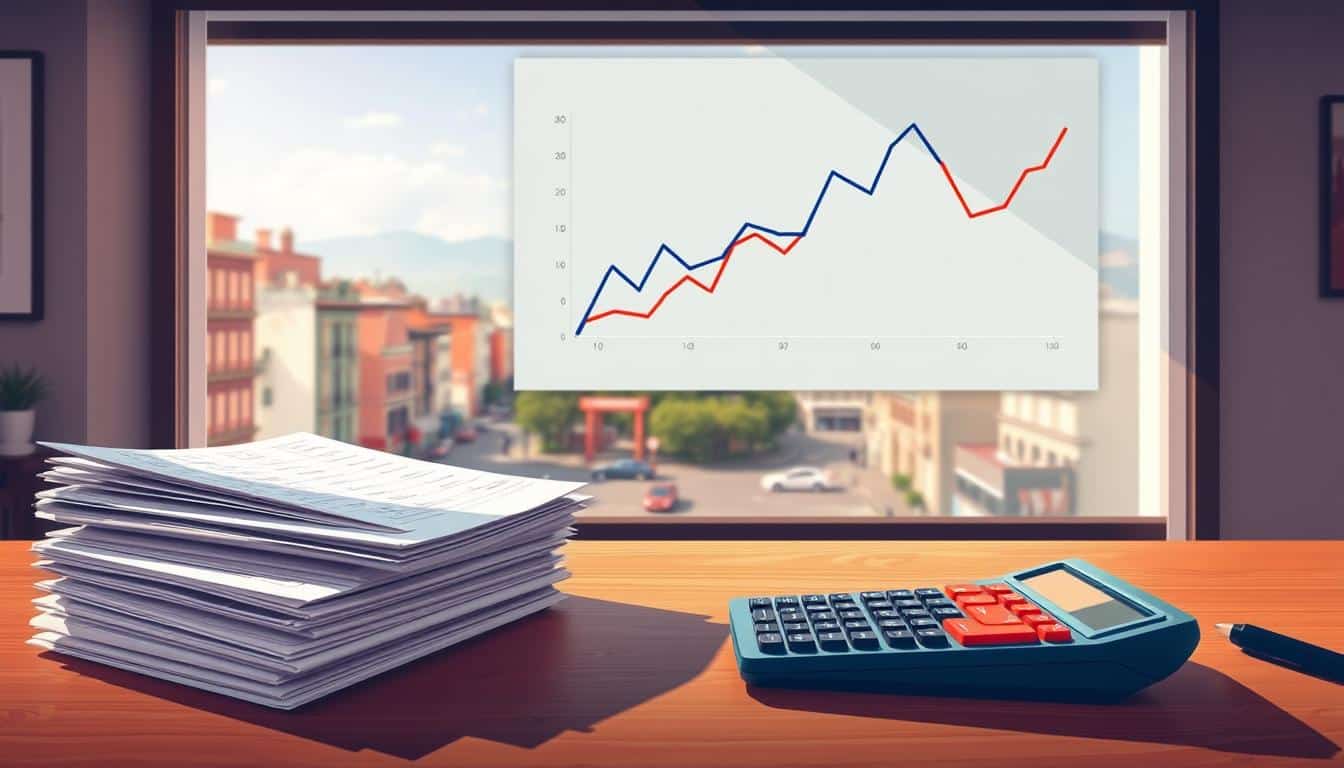In today’s fast-paced financial world, smart investors need economic analysis more than ever. It helps them spot opportunities and make better choices. By diving into market trends and key indicators, you can find important tips for your investments. This guide is here to give you the information you need from detailed economic studies. It will help you handle the tricky parts of investing today with more confidence.

Chase Sapphire Preferred®
The Importance of Economic Analysis in Investing
Economic analysis is a key tool for those looking into finance. It helps investors understand market trends. This understanding allows them to find areas for potential growth.
Anúncios
Figuring out these trends helps investors adjust their portfolios. This can lead to better returns, even when markets change.
Understanding Market Trends
Market trends show patterns in how the economy behaves. They hint at where investments might do well. Spotting these trends helps investors act early, before everyone else.
Important parts of market trends include:
- Price movements of assets
- Shifts in consumer preferences
- Technological advancements influencing sectors
Assessing Economic Indicators
Economic indicators offer data that’s crucial for analyzing investments. Looking at indicators like GDP growth and job rates gives clues about the economy’s health. Paying attention to these indicators helps investors make choices that match how the economy is doing right now.
Some major economic indicators are:
- Gross Domestic Product (GDP)
- Unemployment Rates
- Inflation Trends

Current Economic Climate and Its Effects on Investments
The current economic climate is key for shaping investment strategies. Investors must know how things like inflation affect their money and the market. Inflation can lower purchasing power and change how much assets are worth. When inflation goes up, so do interest rates, increasing borrowing costs for everyone.
Inflation Rates and Their Impact
Keeping an eye on inflation rates is critical for investors. Inflation’s effects can drastically change financial plans. It hits:
- Purchasing power of consumers
- Value of investments over time
- Interest rates and borrowing costs
Investors might have to change their plans to avoid losses due to rising costs and economic unknowns.
Unemployment Trends and Market Stability
It’s vital to understand unemployment trends for gauging market stability. High unemployment hints at economic trouble, affecting both spending and investments. Important aspects include:
- Correlation between employment levels and consumer confidence
- Effects of job market changes on stocks
- Long-term impacts on the economy’s recovery
Following these trends helps investors make smart choices and adjust their portfolios in a changing economy.
Key Economic Indicators Every Investor Should Monitor
Every investor needs to watch key economic health signs. The most important ones are Gross Domestic Product (GDP) and the Consumer Confidence Index (CCI). Interest rates also matter a lot. They impact how people and companies make investment choices and economic activity.
Gross Domestic Product (GDP)
GDP tells us how well a country’s economy is doing. It adds up the value of all goods and services made within a certain time. When GDP grows or shrinks, it gives investors clues about the economy’s strength and future success.
Consumer Confidence Index (CCI)
The CCI shows how people feel about the economy. A high CCI means people are spending money, pushing the economy up. But a low CCI can mean people are worried, which might make investors change their plans to avoid losses.
Interest Rates and Their Influence
Interest rates greatly affect how much it costs to borrow money. When rates are low, it’s cheaper to borrow, which can make people and companies spend more and help the economy grow. But, when rates go up, borrowing slows down, which can slow down growth. Investors need to keep an eye on rates to make smart choices in a changing economy.
Economic Analysis Techniques and Tools
Investing wisely needs using economic analysis techniques. These methods help investors choose the best strategies. They look at past trends to guess future ones. This way, they get a clearer view of market movements and change their plans to do better.
Utilizing Economic Models for Forecasting
Economic models are key for predicting market changes. They include methods like regression analysis to learn from old data. This helps investors spot trends that hint at what’s next, helping them make smart moves for better profits.
Data Analysis Software for Investors
Today’s investors must use advanced data analysis software to stand out. Tools such as PortfolioPilot make reviewing important data easier. This software helps review trends and make choices based on solid data, improving investment tactics.
Investment Opportunities Arising from Economic Analysis
Discovering investment opportunities starts with detailed economic analysis. By exploring different sectors, investors can identify booming industries. This lets them take advantage of economic growth.
It’s key to understand market trends for making wise choices. The economy changes all the time.
Sector Analysis: Which Industries Are Booming?
Sector analysis helps to find out which industries are doing well. Fields like technology and renewable energy are growing fast. These areas are not just profitable but also fit global trends towards being green and innovative.
Emerging Markets and Growth Potential
Emerging markets are now more appealing because of their growth potential. As more global capital enters these areas, investors gain from better infrastructure and bigger consumer markets. Keeping an eye on these markets helps investors find unique opportunities for high returns as these economies grow.
The Role of Geopolitical Factors in Economic Decisions
Geopolitical factors hugely influence the world of finance. They shape how goods and money move across borders. It’s crucial for investors to understand global policies, trade deals, and international relations.
This knowledge can show how different areas might be affected. By studying these, investors can spot opportunities and risks in the market.
Global Trade Dynamics
The global trading scene is always changing, thanks to politics. How countries get along can affect trade. Investors need to keep up with these changes.
They should know how political issues and agreements can open new markets or close them. Watching global trade trends can hint at changes in supply chains and market options.
Navigating Tariffs and Sanctions
Governments use tariffs and sanctions to influence the economy. Tariffs can make products more expensive and shake up competition. Sanctions can limit resources and change markets drastically.
Investors must track these government actions closely. They have a big effect on business success and profit.
Understanding Market Sentiment Through Economic Analysis
Market sentiment shows how investors feel, which is key for financial choices. It’s based on behavioral economics. This looks at how mindsets impact investments. Also, the media’s role in shaping these feelings is huge. Stories can change what people think and expect in the market.
Behavioral Economics in Investing
Behavioral economics digs into how biases and emotions sway investors. Knowing this helps investors make smarter choices. There are several biases to note:
- Overconfidence: Investors may think they know more than they do.
- Loss Aversion: People often fear losing more than they like winning. This impacts how they see risk.
- Herd Behavior: Following what others do can cause market highs and lows.
By knowing these biases, investors can make choices based on facts, not just feelings.
The Impact of News and Media on Markets
Media plays a big role in what investors think. It frames how economic conditions are seen. This can change how people invest. Important points are:
- Media Narratives: How stories are told can boost or reduce investor trust.
- Timeliness: How fast news comes out can impact investor reactions.
- Selective Reporting: Focusing on certain events might give a skewed view of the economy.
Investors should critically look at news and understand its effects on the market. Then, they can adjust their strategies as needed.
Evolving Investment Strategies Based on Economic Analysis
Economic analysis is key in creating modern investment strategies. Investors choose active or passive methods based on their risk levels and market predictions. They use market trends and indicators to spot chances that come with economic changes.
Active vs. Passive Investment Approaches
Active investors manage their portfolios actively. They use up-to-date economic data to take advantage of market shifts. This tactic can bring high returns but needs a lot of focus and skill. In contrast, passive investors take a long-term view. They rely on basic economic principles and market indexes. This strategy cuts down on fees and helps investors gain from market growth over time.
Sector Rotation Strategy Derived from Economic Insights
Sector rotation involves moving money into different sectors based on economic forecasts. Investors use economic signs to spot sectors that might do well. For example, tech and consumer sectors often excel during economic growth. But in tough times, they turn to stable sectors like utilities and healthcare. This way, investors can change their plans and improve their portfolio using current economic analysis.
Investment Risks and Challenges Revealed through Economic Analysis
Investment risks shape financial strategies in big ways. By looking at economic trends, investors learn about market ups and downs. This knowledge helps them make smart choices. Knowing the risks means they can find safe paths in tough times. This leads to stability and growth.
Market Volatility and Economic Cycles
Market changes often link to the economy’s ups and downs. These cycles bring uncertainty for investors. It’s key to understand what causes these shifts. Big changes can make things unstable, like changing prices or losing money. By spotting patterns, investors can get ready for hard times.
Managing Risk in a Changing Economy
As the economy changes, managing risks well is important. Diverse investments can lessen the bad impacts of market changes. This can mean mixing different types of investments, checking things carefully, and using strategies to stay safe. Making strong investment choices helps investors deal with changes and cut down risks.
Lessons from Historical Economic Analysis
Studying economic history helps investors a lot, especially during crises. By looking at past market behaviors, investors can plan better for uncertain times. This helps them make smarter choices.
Case Studies of Past Economic Crises
We gain key insights by looking at past economic crashes. Some key examples are:
- The Great Depression of the 1930s showed the impact of bank failures and low consumer spending.
- The 2008 financial crisis was caused by risky mortgages, leading to a worldwide recession.
- The dot-com bubble burst in the early 2000s demonstrates the dangers of speculative investments.
These examples highlight the need to spot early signs of economic troubles.
Successful Investment Strategies During Economic Downturns
Investing wisely during downturns takes careful thought and strategy. Some successful tactics include:
- Changing your assets around to reduce risk and increase gains.
- Investing in sectors like consumer staples and utilities, which usually do well when the economy is slow.
- Using dollar-cost averaging to lessen the effects of market swings.
These strategies help investors manage during tough times and prepare for recovery.
Future Trends in Economic Analysis for Investors
Identifying future trends is key for economic analysis in investing. Investors need to use tech to stay ahead. This includes better ways to look at market data and understand investor actions. These methods lead to smarter choices.
Technological Advancements and Data Analytics
Now, investors can look through a lot of market data fast and well. Tools like machine learning and artificial intelligence are changing trend forecasts. They make predictions more accurate. This helps investors adjust their plans in time.
Using advanced analytics gives a deeper insight into how markets work. This is a big step forward in understanding economic trends.
Understanding Climate Change’s Economic Impact
Climate change is both a challenge and a chance for investors. Things like new laws, less resources, and changing customer likes impact investments. Investors must adjust their plans for these environmental risks. They should also focus on sustainable industries.
Knowing the effects of climate change helps make investments more secure. This is crucial for lasting success.
Conclusion
Economic analysis is key for investors in today’s complex markets. It helps them dig into trends and keep an eye on important indicators. This lets investors make smart choices.
Using smart analysis lets investors get ahead. It helps them see opportunities early. Also, understanding how world events affect markets is crucial. Mixing these elements boosts their chances of reaching financial goals.
The world’s economy is always changing. Staying updated through detailed analysis is essential. It helps investors tweak their strategies to match new trends. This way, they can make the most of market opportunities.
FAQ
What is the significance of economic analysis in investing?
How can understanding market trends benefit investors?
What key economic indicators should investors monitor?
How does inflation affect investment strategies?
What are some effective techniques for economic analysis?
Why are emerging markets considered valuable for investment?
How do geopolitical factors influence investment decisions?
What role does market sentiment play in investment valuations?
What are the differences between active and passive investment approaches?
What investment risks can be identified through economic analysis?
How can historical economic analysis guide current investment strategies?
What future trends should investors consider in economic analysis?
Conteúdo criado com auxílio de Inteligência Artificial



